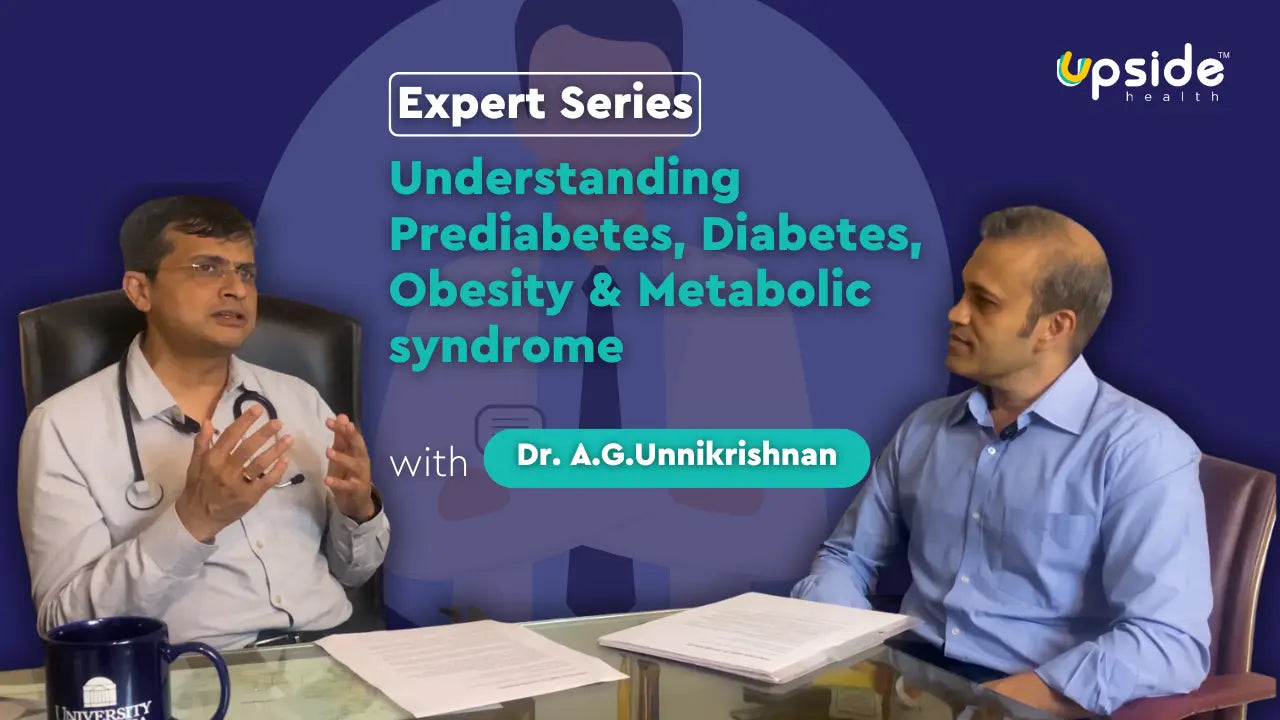
Welcome to a comprehensive guide on understanding prediabetes, diabetes, obesity, and metabolic syndrome with Dr A.G. Unnikrishnan. Dr. Unnikrishnan is a renowned expert in the field of endocrinology and metabolism, with years of experience in researching and treating these conditions.
- Discover the keys to effective Metabolic Syndrome management as Dr. A.G.Unnikrishnan shares expert advice on understanding various health conditions.
- Dive into the world of Diabetes risk factors and gain a comprehensive understanding of Prediabetes symptoms.
- Explore the impact of Obesity on metabolism and unlock essential tips on preventing metabolic syndrome.
Full Transcript:
Mr. Vyas:
Hello everyone! I’m very excited to welcome today’s guest, Dr. Unnikrishnan, one of the leading endocrinologists in the world. He has multiple awards to his name, and is the author of over 200 publications.
Welcome, Dr. Unnikrishnan, to our Expert Series at Upside Health.
Dr. Unnikrishnan:
Thank you. It’s a pleasure to be here.
Understanding Metabolic Syndrome
Mr. Vyas:
To begin, could you simplify what metabolic syndrome really is and why it matters?
Dr. Unnikrishnan:
India is often called the diabetes capital of the world, with more than 77 million people affected. But diabetes is only one part of metabolic syndrome, which also includes:
- Hypertension (high blood pressure)
- Obesity
- High cholesterol
- Heart disease
All of these conditions cluster together as metabolic syndrome. Among South Asians, these problems occur at a younger age — often a decade earlier than in Western populations.
One key reason is abdominal obesity — excess fat around the waist, which contributes significantly to type 2 diabetes and heart disease.
The “Ticking Clock Hypothesis”
Mr. Vyas:
Do these conditions happen in a sequence, or do they develop together?
Dr. Unnikrishnan:
We don’t know for sure, but there’s an interesting idea called the “ticking clock hypothesis.” It suggests that while diabetes may be diagnosed when blood sugar rises, the underlying processes and risks for heart disease begin years earlier.
Think of it like an iceberg: what you see above the surface — high blood sugar or blood pressure — is just a small part. Below the surface lies a much larger problem: metabolic dysfunction, which can include obesity, hypertension, cholesterol issues, diabetes complications (like eye, kidney, or heart damage), and more.
Early Signals to Watch Out For
Mr. Vyas:
What are the warning signals people often ignore before diabetes is diagnosed?
Dr. Unnikrishnan:
- Family history: If both parents have diabetes, the child’s risk is very high.
- Waist circumference: Increasing waist size is a red flag for abdominal fat.
- Borderline results: If your doctor says, “Your blood sugar/BP is a little high, but not high enough for medicines,” that’s a signal to act.
Researchers are also looking at new biomarkers that may predict metabolic syndrome even earlier.
Reversal or Remission?
Mr. Vyas:
Is diabetes reversible, or just manageable?
Dr. Unnikrishnan:
Earlier, doctors believed type 2 diabetes always progressed — from diet → one pill → multiple pills → insulin. But studies now show it can be brought to normal levels with lifestyle changes.
However, the word “reversal” is misleading. The correct term is “remission.”
Like cancer, diabetes can go into remission with proper diet and lifestyle, but if you relax, it can relapse. That’s why sustained changes are critical.
Lifestyle as the Biggest Culprit
Mr. Vyas:
Would you say lifestyle is the main cause behind rising diabetes rates?
Dr. Unnikrishnan:
Absolutely. While genetics play a role, the biggest drivers are lifestyle factors:
- Excess sugar and refined foods (junk food doesn’t just mean Western fast food; it includes Indian sweets, fried snacks, etc.)
- Lack of physical activity
- Stressful modern living
- Poor sleep
Each generation is now developing these diseases earlier than the previous one, because activity levels drop, diets worsen, and stress rises.
The Role of Sleep & Biological Clocks
Mr. Vyas:
You mentioned sleep. How important is it?
Dr. Unnikrishnan:
Very important. Good sleep lowers the risk of diabetes, heart disease, and even improves longevity.
We now know every organ has its own biological clock. If you stay up late, watch TV, then eat at midnight, your brain thinks it’s night, but your gut thinks it’s day. This mismatch disrupts metabolism and increases risk of diabetes and obesity.
- Patient Empowerment
Mr. Vyas:
In today’s healthcare world, how do you empower patients to manage their health?
Dr. Unnikrishnan:
Diabetes management is now a collaboration between doctor and patient. With so much information available, patients understand carbs, fats, and diets better than before.
So treatment now combines:
- Scientific evidence
- Patient’s choices
- Doctor’s experience
Together, these help people manage or even put diabetes into remission.
Preventive Guidelines
Mr. Vyas:
Finally, what are your top five guidelines to help people prevent metabolic syndrome?
Dr. Unnikrishnan:
- Healthy diet – Choose whole, unprocessed foods; minimize refined carbs and sugars.
- Physical activity – Exercise regularly or play a sport you enjoy.
- Stress management – Reduce stress through hobbies, mindfulness, or relaxation.
- Good sleep – Maintain sleep quality and duration.
- Hydration & social health – Drink enough water, and maintain strong family/social connections to avoid loneliness.
For those with diabetes, regular monitoring of blood sugar is also essential.
Closing
Mr. Vyas:
That’s an excellent summary. Thank you, Dr. Unnikrishnan, for your time and insights.
Dr. Unnikrishnan:
Thank you, Mr. Vyas, and the Upside Health team. It has been a pleasure to be on your program.








Comments (0)
Back to Learn